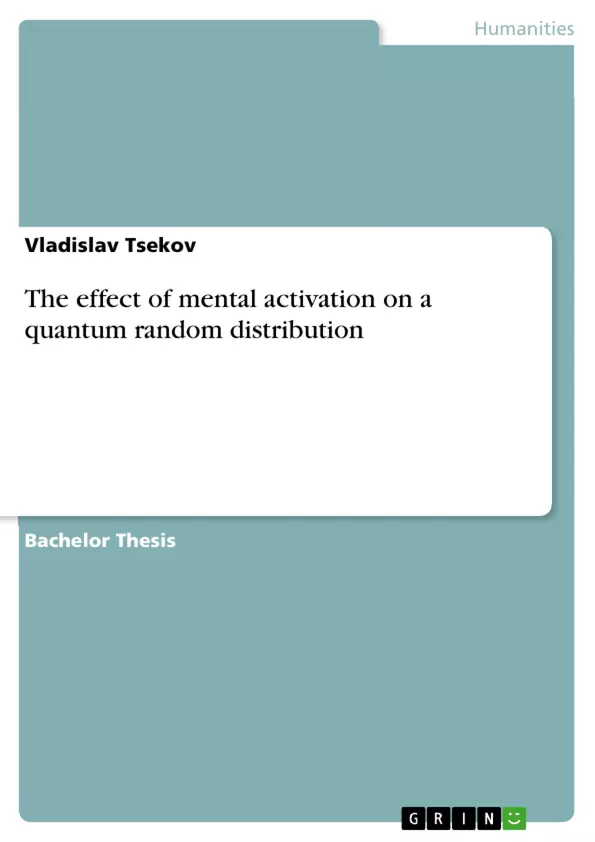The term psi denotes all phenomena which cannot be explained by the laws of classical physics. Precognition is a form of psi, whereby the future influences the present. We conducted a study to test if strong mental activation through high-arousal visual stimuli caused smokers to exhibit precognition and influence a quantum random distribution in their favor. A Bayesian one sample t test revealed a Bayes Factor BF10 = 12.56, indicating strong evidence for the display of precognition. We found no gender differences and no statistically significant influence of nicotine dependency or smoking addiction on precognition. We outline several explanatory models of quantum mechanics and discuss limitations of the study as well as possible implications of psi-phenomena.
Inhaltsverzeichnis (Table of Contents)
- 1. Introduction
- 1.1. The Double-Slit Experiment
- 1.2. Copenhagen Interpretation
- 1.3 Many-Worlds-Interpretation
- 1.4. Psychology and Psi...
- 1.5. Psi and Randomness.
- 2. Method
- 2.1. Participants.
- 2.2. Apparatus and Materials...
- 2.3. Procedure..
- 3. Results
- 3.1. Bayesian Statistics..
- 3.2 Frequentist Statistics
- 4. Discussion
- 4.1. General Discussion...
- 4.2 Limitations.
- 4.3. Implications.
- 4.4. Conclusion...
- 5. References.
Zielsetzung und Themenschwerpunkte (Objectives and Key Themes)
This thesis aims to investigate the potential influence of strong mental activation on a quantum random distribution. Specifically, it explores the idea of precognition – a form of psi phenomena where the future influences the present – in smokers experiencing high-arousal visual stimuli. The study utilizes a Bayesian analysis to assess evidence for precognition and explores potential explanatory models for the observed effects.
- The role of mental activation in influencing quantum randomness
- The concept of precognition as a form of psi phenomena
- The application of Bayesian statistical methods to analyze data related to psi phenomena
- The potential impact of smoking and nicotine dependency on precognition
- The implications of the study's findings for understanding the relationship between consciousness and quantum mechanics
Zusammenfassung der Kapitel (Chapter Summaries)
The introductory chapter delves into the world of quantum mechanics, particularly focusing on the iconic double-slit experiment and its implications for understanding the nature of reality. The chapter introduces the concept of psi and its connection to randomness, laying the foundation for the research question. The subsequent chapters delve into the methodology employed in the study, including the selection of participants, the apparatus and materials used, and the detailed procedures. The results section presents findings from both Bayesian and Frequentist statistical analyses, revealing the key insights from the data. The discussion chapter offers a comprehensive interpretation of the results, exploring limitations of the study and potential implications for understanding psi phenomena.
Schlüsselwörter (Keywords)
The central focus of this thesis lies on the intersection of consciousness, quantum mechanics, and parapsychology. Key terms include precognition, psi phenomena, Bayesian statistics, random number generators, and the interplay between the macroscopic and microscopic worlds. The study investigates potential connections between mental activation, particularly in the context of smoking and visual stimuli, and their influence on quantum randomness.
Frequently Asked Questions
What is the main objective of this study on quantum randomness?
The study tests if strong mental activation through high-arousal visual stimuli can cause smokers to exhibit precognition and influence a quantum random distribution.
What does the term "psi" mean in this research?
"Psi" denotes phenomena that cannot be explained by the laws of classical physics, such as precognition, where the future allegedly influences the present.
What were the key findings regarding precognition?
A Bayesian analysis revealed strong evidence (Bayes Factor 12.56) for the display of precognition in the participants studied.
Did smoking addiction or gender influence the results?
No, the study found no gender differences and no statistically significant influence of nicotine dependency or smoking addiction on the precognition effects.
Which quantum mechanics interpretations are discussed?
The thesis outlines several models, including the Copenhagen Interpretation and the Many-Worlds Interpretation, to explain the relationship between consciousness and physics.
- Arbeit zitieren
- Vladislav Tsekov (Autor:in), 2016, The effect of mental activation on a quantum random distribution, München, GRIN Verlag, https://www.grin.com/document/356405



